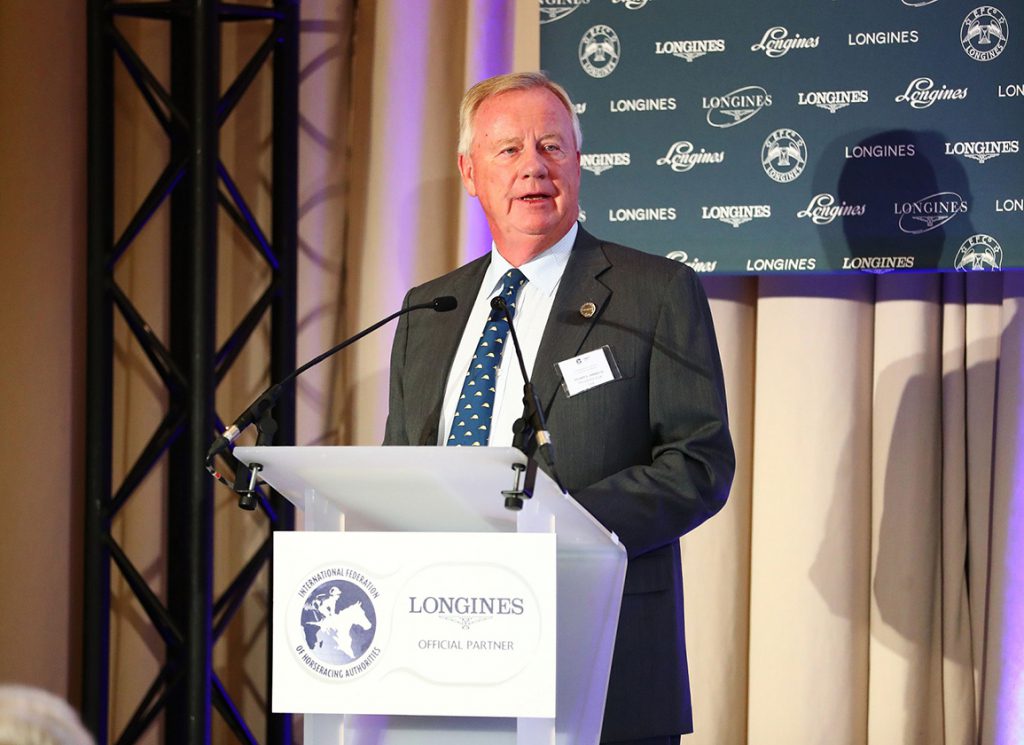The Jockey Club of America Chairman Stuart S. Janney III will be honored with the Eclipse Award of Merit at the 53rd Annual Eclipse Awards Dinner and Ceremony at The Breakers Palm Beach in Florida on Thursday, Jan. 25, the National Thoroughbred Racing Association (NTRA) said in a Friday release.
“The Eclipse Award of Merit is the Thoroughbred industry's highest honor, bestowed upon an individual who has displayed a lifetime of achievement in service to the sport,” reads the press release from the NTRA. “Janney's decades of involvement and leadership within the sport of Thoroughbred racing has bettered the sport for future generations.”
“I am honored to have been chosen for the Eclipse Award of Merit and sincerely thank those who selected me,” said Janney. “This sport, and its future, have always been my top priority, and I am appreciative of the support of so many who have joined us on the journey to improve Thoroughbred racing and breeding for generations to come.”
As an owner and breeder, Janney has campaigned numerous top-class horses, including homebred graded stakes winners Coronado's Quest (Forty Niner), winner of the GI Haskell S. and GI Travers S. in 1998, Air Support (Smart Strike), Celestial City (Uncle Mo), Data Link (War Front), Hymn Book (Arch), Ironicus (Distorted Humor), Norumbega (Tiznow) and On Leave (War Front). Janney, in partnership with the Phipps Stable, was co-owner and co-breeder of 2013 GI Kentucky Derby winner Orb (Malibu Moon) as well as GISW Carriage Trail (Giant's Causeway).
Born into a Maryland racing family, Janney was raised with an appreciation of the sport through his parents and grandparents. The former, Stuart and Barbara Janney, bred and owned the Eclipse Award-winning champion and Hall of Fame inductee Ruffian. In the 1990s, the younger Janney began owning and breeding Thoroughbreds on his own and has continued to do so for more than three decades.
Janney's reach and influence extends well beyond the winner's circle into many of Thoroughbred racing's most important organizations. Janney has been a member of the Thoroughbred Owners and Breeders Association since 1992, serving as chairman from 1997 to 2001 and having served multiple terms on the board of trustees. He also served as a board member of the Maryland Horse Breeders Association from 1992 to 1997 and president of the Maryland Million Ltd. from 1994 to 1997. He was appointed by Maryland Governor Parris Glendening in 1999 to chair the Maryland Commission to Study Ways to Improve the Financial Viability of the Racing Industry. Additionally, Janney served on the board of Keeneland from 1998 to 2015. He currently serves on the board of The New York Racing Association, Grayson-Jockey Club Research Foundation, Equibase Company and BloodHorse LLC.
“Stuart Janney's career has been that of dedication and service to both the horse and the entirety of the Thoroughbred racing industry,” said NTRA President and CEO Tom Rooney. “The Eclipse Award of Merit is in appreciation for all his efforts. Stuart's leadership, commitment, and passion for this industry is unquestionable and I thank him for all his work.”
“I offer my sincerest congratulations to Stuart Janney on being honored with the Eclipse Award of Merit,” said trainer Shug McGaughey, who has worked with Janney for decades. “I've trained horses for Stuart since 1988, and he has been an excellent client for me, always putting the welfare of his horses and the people who work with them first. As The Jockey Club chairman for the past decade, Stuart has my admiration for taking on the tough and often unpopular issues that we, as a sport, must face. I know it hasn't always been easy for him, but time and again I've seen him guided only by his principles: do the right thing for the horse.”
“Finally, I am proud to call Stuart my friend, and I wish he and his family my thanks for entrusting his horses with me for so many years,” said McGaughey.
As chairman of The Jockey Club since 2015, Janney has played a pivotal role in initiatives such as the creation of the Thoroughbred Aftercare Alliance and the passage of the Horseracing Integrity and Safety Act (HISA). Under his leadership, 5 Stones intelligence was engaged to investigate horse racing, resulting in federal prosecutions and significant penalties. Janney previously chaired The Jockey Club's Thoroughbred Safety Committee, making numerous recommendations for industry improvements.
Before his racing involvement, Janney had a career in the federal government, practiced law, and served as a managing director at Alex Brown & Sons. He is chairman emeritus of Bessemer Trust Company and is involved in various organizations, including serving on the board of King Ranch Inc.
Janney, a graduate of the University of North Carolina and the University of Maryland School of Law, is married with two children and resides in Butler, Maryland.
The post Jockey Club Chairman Stuart Janney To Receive Eclipse Award Of Merit appeared first on TDN | Thoroughbred Daily News | Horse Racing News, Results and Video | Thoroughbred Breeding and Auctions.

